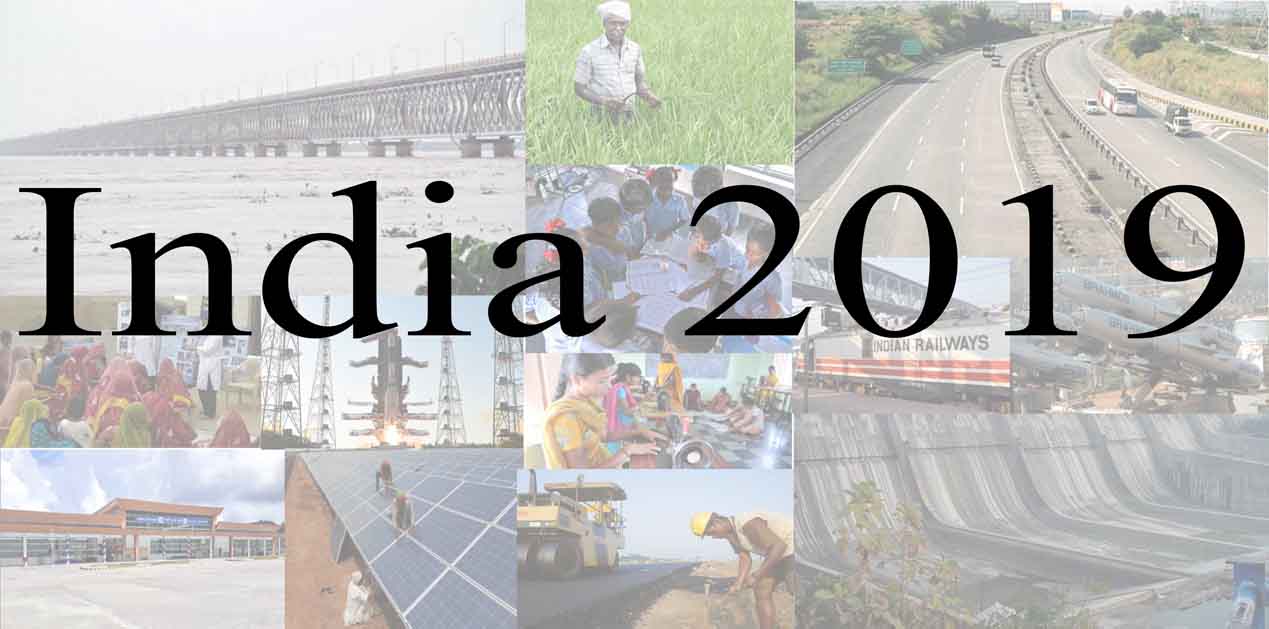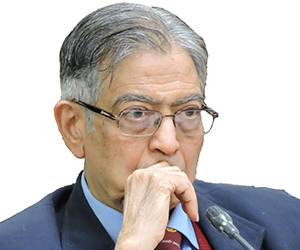While more has been achieved by the Modi government than many earlier governments, there are still many long-standing challenges that face India which need to be addressed in 2019. The most daunting of these may be listed as the governance deficit, ineffective policing, neglect of defence capabilities, and the existential threat posed by Pakistan and China.
Governance Deficit
Governance deficit which has plagued India for decades adversely affects the delivery of services at all levels and in all spheres and thus hobbles the country.
While at the local level, India struggles to provide basic health care, decent primary education, potable water and sanitation facilities, at the national level such excellent schemes as never earlier thought of - like Swacch Bharat, Ayushman Bharat, Ujjwala, Jandhan, Aadhar and Mobile (JAM), Make in India, Smart Cities etc. - have begun to change the mind-set of citizens, but did not secure optimal outcomes as yet. This may take some time. Relentless focus on implementation of these and other schemes is required. Development projects, both at home and abroad, have unacceptably huge time and cost over runs as do critical border roads and defence procurements. At a more down-to-the-earth level, living in any Indian city is hazardous on account of annual flooding, pollution, absence of effective waste and sewage disposal, a variety of easily preventable vector borne diseases, traffic congestion, breakdown of law and order and an absence of sensitivity for woman and child safety.
India can never realise its full potential until and unless this governance deficit is squarely addressed. Much of this arises from the fact that our bureaucracy, having been thoroughly politicised, is ridden by apathy, lack of innovation, absence of drive, corruption, and sycophancy.
Reviving and reinvigorating the bureaucracy would demand its insulation from undue political interference and a systemic overhaul of the administrative procedures and structures which we inherited from colonial times. Simplification of rules and regulations, establishment of clear, well conceived, and comprehensive standard operating procedures on each issue, empowerment of officials and their being held accountable for specific targets would go a long way to improve the situation. The remedial action to be taken is well known as there have been over 600 1 committees and commissions since independence which have gone into administrative reforms and made scores of recommendations. All that needs to be done is to summon the political will to bring in much needed reform.
Pending such a systemic overhaul, a monitoring unit should be set up in the Prime Minister’s Office (PMO) to ensure that at least the projects and programmes of the highest importance are undertaken in an effective and time bound manner. Prime Minister Modi has taken personal interest in monitoring high profile project and pushed the bureaucracy to be more agile and responsible. But our problems are huge. Appropriate methodologies of monitoring would have to be evolved. Delivery of governance on basics at the local level could be monitored by the Cabinet Secretary through the Chief Secretaries. Where states are unresponsive, a carrot and stick approach would have to be devised to ensure that they deliver on key governance issues.
Ineffective Policing
Existence of law and order is not only the right of every citizen but is a pre- requisite for progress and development. Unfortunately, the situation in India in this regard is at a low ebb, with the capabilities of the police force having been severely attenuated over the decades. All manner of crime is rampant throughout the country and people have little confidence in the police which also does not inspire fear amongst criminal elements. Repeated bouts of lawlessness and rioting in various parts of the country have amply demonstrated the frailties of policing in India. The police which used to provide grass roots level intelligence in the past no longer does so. It is sad but true that our policemen are overworked and underpaid. They are also ill equipped and ill trained. Many are corrupt. Political influence has further undermined their effectiveness. The solution is early implementation of the reforms recommended by any number of committees including filling the huge gaps in vacancies, training, and sensitisation.
One of the knotty issues in this regard is the fact that law and order is a state subject and implementation of some of the recommendations, notably on police modernisation, are likely to run into problems particularly in states controlled by opposition parties who are unwilling to spend the required resources on it. In the past, the Centre used to allocate the bulk of the resources for this purpose but of late it has been allocating smaller amounts as the states are now beneficiaries of a larger proportion of the national resources. As this is a state subject it is logical for them to do the needful. The states, however, spend the minimum possible on the police and provide barely enough for salaries. One way out of this impasse is to create an escrow account for each state for police modernisation into which the Centre and the states would deposit their respective pre-determined shares and the state could dip into it only for purposes of police modernisation.
As regards the insulation of the police from political influence, the Supreme Court's directions of September 2006 provide a clear set of guidelines in the matter. In short, these directions envisage fixity of tenure for police officers and debar political involvement in their postings and transfers, indeed in all service matters related to them. Regrettably, these reforms were opposed by several states and remain unimplemented. Government would be well advised to push for implementation of the Supreme Court's directions in the matter, and if necessary make this an election issue as political interference is the bane of good policing in the country.
Neglect of Defence Capability
India's defence capabilities have been neglected by successive governments. Current defence expenditure at about 1.5 percent of GDP is at a historic low. Consequently, the Armed Forces are grossly underequipped and face huge shortfalls in military hardware. Procurement continues to be a tardy process and equipment urgently required takes years to come. Indigenisation continues to be a problem and it is sad that 70 years after independence we are still dependent for 70 percent of our requirements on imports. Additionally, the civil-military relationship, never very good at the best of times, continues to be troubled and is mired in mutual mistrust.
Given our tense geo-political environment where we face a real and present Sino-Pakistan collusive military threat, it is imperative that India's military machine is rapidly strengthened and is maintained in fine fettle. Pakistan's daily provocations across the Line of Control (LoC) and China's frequent incursions along the Line of Actual Control (LAC) are to an extent the result of a perception that India does not have the muscle to take effective counter-measures. A perceptibly powerful military machine would to a great extent deter such moves by Pakistan and China.
A rapid ramp-up of our defence capabilities demands an enhancement of defence spending to at least 3 percent of the GDP, revamping of procurement procedures and policies so as to minimise delays, greater indigenisation in production of defence equipment, elimination of civil-military tensions through increased induction of uniformed personnel in the Defence Ministry and creation of a security cadre to man it, and the undertaking of long pending higher defence management reforms like the creation of the office of Chief of Defence Staff.
Sino-Pak Existential Challenge
While Pakistan's inimical mindset towards India is congenital, China's anti- Indian policies emanate from its hegemonic tendencies which cannot countenance India's rise. Hence the threat from both countries is existential and cannot be wished away. Moreover, both countries are close allies and prone to act collusively against India. Accordingly, India's placatory approach must be replaced by one designed to impose costs on them.
In respect of Pakistan we need to play on its fault-lines, expedite the full utilisation of the Indus waters as permitted under the Indus Waters Treaty, build storages in Afghanistan on tributaries of the Indus in that country, make known that we do not recognise the Durand Line, undertake repeated surgical strikes, authorise our agencies to eliminate notorious terrorists in Pakistan, downsize and downgrade our diplomatic mission in Pakistan, and enact a law declaring Pakistan a terrorist state.
As regards China, while our hedging strategy of cultivating its neighbours and important players like the US and Japan should be intensified, we must also develop appropriate counters to Chinese pin-pricks such as border intrusions, stapled visas, arming of Pakistan, Peoples Liberation Army’s (PLA) presence in Pakistan Occupied Kashmir, obduracy on the Masood Azhar issue, and opposition to India’s quest for a permanent seat on the UN Security Council and the Nuclear Supplier Group (NSG) membership.
As part of this exercise we should review our commercial ties with China so that our massive trade imbalance of $50 billion is drastically reduced. Furthermore, we need to think out of the box and inter alia examine the feasibility of playing the Tibet and Sinkiang cards. Indeed, expression of sympathy for the brutally victimised Uighurs will not only adversely affect China but will also greatly improve India’s standing with the Muslim community at home and abroad and will shatter Pakistan’s efforts to project itself as the champion of Islam the world over.
(Shri Satish Chandra is a former Secretary, Ministry of External affairs and a former Deputy National Security Advisor. He is one of the founder members of the Vivekananda International Foundation).
Reference
- "Good Governance Never on India's Radar" Madhav Godbole pg 250.
Image Sources











Post new comment